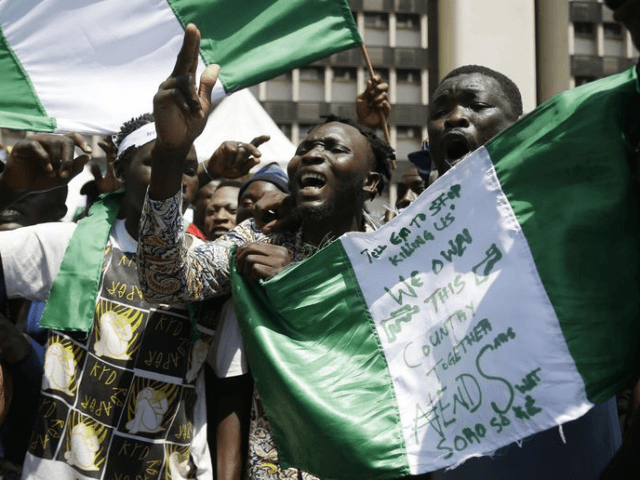Nigerian paramilitary police reportedly opened fire on protesters in several cities on Tuesday, killing and injuring dozens of people, including bystanders.
Eyewitnesses claimed they also saw military troops in camouflage uniforms shooting at the demonstrators, reports the Nigerian Army denied. The demonstrators were protesting against police brutality, particularly by a federal paramilitary unit known as the Special Anti-Robbery Squad (SARS).
Protests against SARS began in early October. The unit was established in 1992 as a special squad trained and equipped to deal with major crimes such as kidnapping and robbery. The protesters say SARS itself has become quite adept at kidnapping and robbing citizens, as well as torturing and killing prisoners.
Allegations of human rights violations dogged SARS for years, including critical reports from international organizations such as Amnesty International and Human Rights Watch. Mass protests erupted after videos of SARS officers beating, and apparently executing, suspects began circulating online. Complaints of past abuse began flooding Nigerian social media, while a growing number of international observers joined prominent Nigerians in for immediate reform. A hashtag called #EndSARS became popular around the world.
SARS was officially disbanded on October 11, but its officers were generally reassigned to other units instead of being terminated. Protests against police brutality continued and escalated, as did the police response. The protest movement still refers to itself as EndSARS, even though SARS is technically gone.
Conditions in Lagos, Nigeria’s largest city, descended into anarchy on Wednesday, with reports of widespread looting and vandalism. At least one television station went off the air after protesters broke in and forced the employees to leave. Public transit buses were set on fire at a bus station. A statewide curfew was imposed, shutting down the busy Lagos airport, but unrest on the streets continued.
CNN reported on Wednesday that Nigerian police and/or military forces opened fire on the protesters at a toll plaza in Lagos. An eyewitness said, “Members of the Nigerian Army pulled up on us and they started firing … they were shooting, they were firing straight, directly at us, and a lot of people got hit.”
Witnesses said the shooting continued for up to half an hour, leaving “multiple bodies laying on the ground.” The Nigerian government pledged to investigate the incident, while the governor of Lagos sought to de-escalate the situation by instructing security forces not to arrest anyone for violating the curfew.
Governor Babajide Sanwo-Olu was highly critical of the protest movement when he imposed the curfew on Wednesday morning.
“Dear Lagosians, I have watched with shock how what began as a peaceful EndSARS protest has degenerated into a monster that is threatening the well-being of our society,” he said.
Nigeria’s Daily Trust reported dozens of people were killed in Lagos and five other cities, while “many others sustained injuries following altercations in the ongoing #EndSARS protests in different parts of the country.”
“Among the victims were security operatives, pro and anti- SARS protesters and passers-by. Business premises and vehicles were also destroyed as those for and against #EndSARS protests targeted each other,” the Daily Trust wrote, noting that “miscreants” were taking advantage of the chaos to “loot and maim in different places.”
Police officials denied fatally shooting five protesters in the city of Abuja, where protesters set a local police station and several police and commuter vehicles on fire. Witnesses said the demonstration was peaceful until the police arrived on the scene and “immediately” opened fire.
The Daily Trust quoted reports that the unrest assumed “religious and ethnic dimensions” as both a mosque and a church were set on fire in Abuja, while homes and businesses were torched in the cities of Kano and Mushin. Some locals complained the police did not deploy and restore order quickly enough to prevent the “monumental destruction of lives and property.”
Both EndSARS and pro-government counter-protesters were blamed for vandalism and violence. According to the Daily Trust report, when the police station in Lagos was set on fire, armed “hoodlums known as ‘Area Boys’” staged a jailbreak and also raided the police armor, stealing weapons, ammunition, and police uniforms. Several police officers and a customs official were reportedly killed in the violence, the latter allegedly killed by an unidentified protester while he was pursuing suspected smugglers.
The Premium Times of Nigeria said on Wednesday that at least seven people died at the Lekki toll plaza. The report described “multiple videos captured by citizens” that showed “terrified citizens crouching and screaming as gunshots rented [sic] the air.” A Nigerian artist named DJ Switch streamed the shootings live on her Instagram page.
The Premium Times cited “panic on social media” after photos were posted that appeared to show “unknown men” pulling down the closed-circuit television cameras at the Lekki plaza. Witnesses also said street lights were deliberately knocked out before the assault on the plaza began.
The Nigerian Army insisted all reports of its personnel shooting at protesters were “false,” even after reporters showed video of shooters in camouflage uniforms to a military spokesman.
Nigerian-born Manchester United soccer player Odion Ighalo was among those who did not believe the military’s denials.
“The Nigerian government, you guys are a shame to the world for killing your own citizens, sending military to the streets to kill unarmed protesters because they are protesting for their own rights? It’s uncalled for,” he said in a tweet on Wednesday.
“You people will be remembered in history as the first government to send the military to the city to start killing their own citizens,” Ighalo continued passionately, although incorrectly, since a distressing number of governments have in fact sent their military into cities to kill their own citizens, and several of them are currently sitting on the U.N. Human Rights Council.
“I am ashamed of this government, we are tired of you guys and we can’t take this anymore,” Ighalo said.

COMMENTS
Please let us know if you're having issues with commenting.